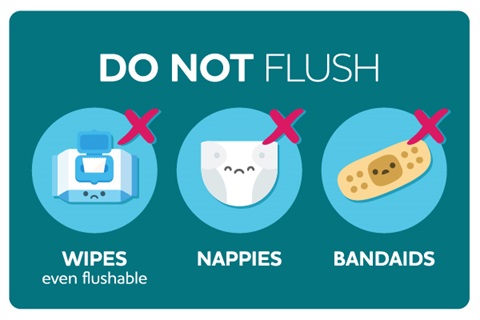
Keeping Byron’s wastewater flowing sounds as simple as A-B-C, but Council is issuing a timely reminder that toilet flushing should only involve three Ps – pee, poo and paper.
With the recent shortage of toilet paper during the COVID-19 pandemic people have been using other products such as wipes, facial tissues, napkins and paper towels as substitutes for toilet paper.
Byron Shire Council’s Engineer for Utilities, Dean Baulch said the increased use of wet wipes and other toilet paper substitutes during the home isolation period has resulted in blockages at the Shire’s sewage treatment plants.
“No one likes a sewer choke – not residents and not Council staff and in extreme cases, sewer chokes can cause a back-up in the sewer system and result in an environmental spill, which can then impact on local waterways,” Mr Baulch said.
Every year Council removes blockages in the sewer caused by a build-up of wet wipes and other things such as nappies, band-aids and sanitary products.
“It’s costly for Council and ratepayers to fix equipment at the sewage treatment plant, but this cost is completely avoidable if everyone follows the three Ps rule,” he said.
To remind everyone that toilets should only be used to dispose of poo, pee and toilet paper (the three Ps) Council is rolling out a new social media awareness campaign.
Council will also be supplying stickers and reminder cards to holiday accommodation providers and real estate agents to place in properties to remind visitors of best practice while in Byron’s bathrooms.
“Regardless of what packaging says, no wipes should be flushed down the toilet, even if they claim to be safe for sewer systems,” Mr Baulch said.
“By simply remembering the three Ps, we can all make a huge difference and keep Byron Shire’s sewer system flowing smoothly.”
The campaign is also a reminder that it’s not just bathroom behaviour that can cause the blockages.
Fats, oils and grease from residential and commercial kitchen waste can also contribute to a bottleneck in the sewer system.





